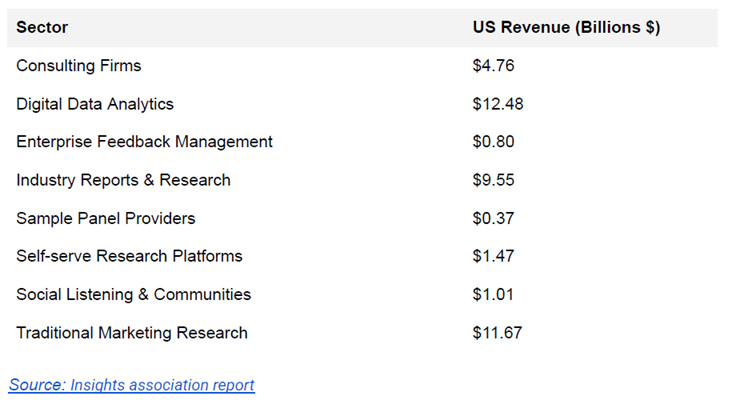Will AI replace researchers – or redefine their role?

So is this the moment when research finally automates itself? Or will AI, as so often before, simply change what it means to do great research?
Before answering, it’s worth looking at where the industry stands today. Despite the rise of automation, traditional research firms still account for 28% of total US insights revenue – proof that human expertise remains central to the business of understanding people.

Lessons from the first self-serve revolution
When the first DIY survey platforms emerged, they were genuinely revolutionary. Suddenly, anyone could collect data at scale without a single clipboard or mall intercept in sight. It was faster, cheaper, and more democratic. But it was also messier.
The revolution didn’t end – it commercialised. The online survey software market was worth around $3.6 billion in 2023 and is projected to reach $7.35 billion by 2025, with analysts forecasting continued double-digit growth in the years ahead. Yet, despite this explosive growth, the limitations remain familiar.
The early promise of "you can do it all yourself" soon ran into reality: access to data isn’t the same as understanding it. Researchers returned to the centre of the process because clients realised that designing a good study – knowing which questions to ask and how to interpret the results – still required human judgment. The industry didn’t disappear; it evolved, developing new roles around data quality, design, and storytelling.
The new wave of AI research platforms
Today, AI platforms echo that same promise of end-to-end automation. They can transcribe, translate, summarise, and even generate entire reports in minutes. But as impressive as that sounds, the parallels with the past are striking.
Just as online surveys transformed how data was gathered but not why we gather it, AI will transform how we analyse – not why we interpret. Researchers and agencies aren’t just conduits for information; they bring the context, creativity, and conviction that turn data into meaning.
They also bring reputation – the credibility that gives insights weight inside an organisation. What clients are really paying for If you ask most brand leaders what they want, few will say "full automation." What they want is conviction – confidence that the insights they act on are credible, nuanced, and grounded in human reality.
That’s why the most successful research partnerships still revolve around judgment, empathy, and trust. AI can accelerate the process, but it can’t take the meeting, persuade the stakeholders, or fight for the idea. Machines don’t carry reputations or take responsibility – and sometimes, that’s exactly what clients are buying.
Recent research supports this. A 2025 study comparing AI-only vs. combined human and AI advice found that people are more likely to trust and act on recommendations when a human is involved. As the authors note, “the benefit stems from human involvement acting as a peripheral cue that increases the advice’s affective appeal.” In other words, even when AI delivers accurate answers, it’s the human presence that makes those answers believable and motivating.
Ultimately, the biggest thing humans can still do better than AI in research is convince people. The ability to translate insight into action – to rally an organisation behind a new direction – remains irreplaceable.
Avoiding the data deluge
There’s another reason to keep humans in the loop: quality. As automation lowers the cost of research, we risk producing more data but not necessarily better data. Panels get fatigued, audiences tune out, and signal-to-noise ratios collapse.
It’s a pattern we’ve seen in other industries. AI’s impact often begins with destruction before giving rise to something new. First, AI flooded the internet with content – now, human-led communities, expert recommendations, and real-world experiences carry a higher premium. In software, the rise of “vibe coding” shows a similar shift, where intuition and context matter as much as code itself. Research may be entering a comparable moment – a fast food era of quantity over quality, where speed and convenience risk overshadowing craft and credibility.
Collecting the wrong data, as one researcher put it, "is worse than being ignorant." Without careful oversight, over-automated systems can end up feeding on their own outputs – a feedback loop that produces homogenous, low-value insights. The challenge isn’t gathering more; it’s knowing what’s worth gathering.
The CoLoop perspective
At CoLoop, we see AI not as a replacement for researchers but as a catalyst for their creativity and confidence. Our mission is to build tools that handle the heavy lifting – the transcription, summarisation, and search – so people can focus on the parts of research that are deeply, uniquely human: interpreting, connecting, and storytelling.
In practice, that looks like moderators using CoLoop to recall key quotes instantly after a session, or strategists pulling together themes from hundreds of interviews in hours rather than days. The technology handles the repetition so researchers can spend their energy on persuasion, synthesis, and impact.
We’ve seen this hybrid model deliver dramatic improvements – projects reduced from four days to four hours without sacrificing quality or depth. The result isn’t "AI-led" research. It’s human-led research, AI-powered.
Looking ahead: the hybrid era
So how quickly will all this change? Faster than most expect, but not overnight. The next few years will see research teams rebalancing their skills – learning to design studies across multiple data types, combine quantitative and qualitative signals, and interpret through a broader, more contextual lens.
The researchers who thrive won’t be those who resist AI, nor those who blindly automate everything. They’ll be the ones who treat AI as a creative collaborator – a way to reach higher quality, faster delivery, and deeper storytelling.
Maybe this time is different. Not because AI replaces people, but because it finally allows them to focus on what humans do best: making sense of other humans.

We hope you enjoyed this article.
Research Live is published by MRS.
The Market Research Society (MRS) exists to promote and protect the research sector, showcasing how research delivers impact for businesses and government.
Members of MRS enjoy many benefits including tailoured policy guidance, discounts on training and conferences, and access to member-only content.
For example, there's an archive of winning case studies from over a decade of MRS Awards.
Find out more about the benefits of joining MRS here.













0 Comments